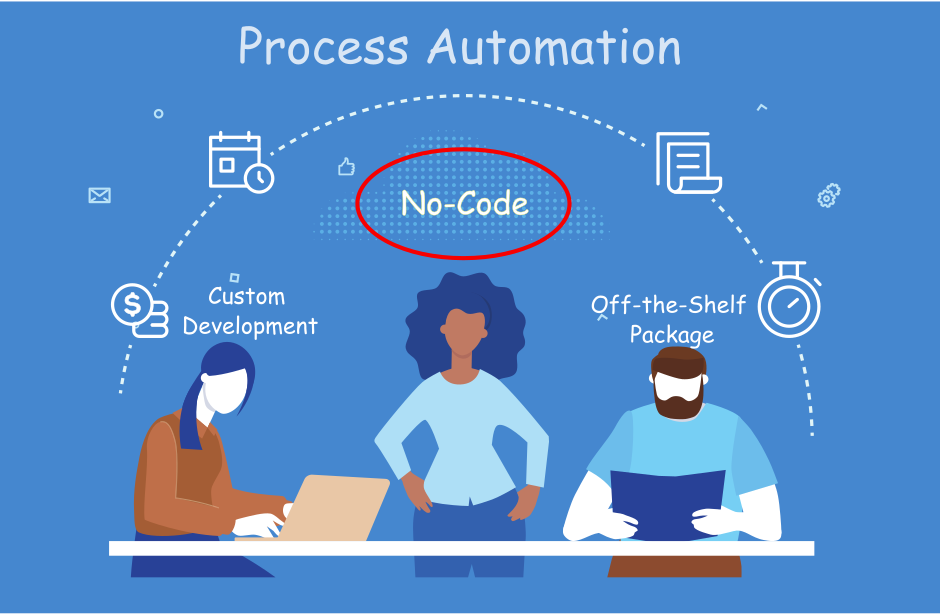Digitization is more topical than ever. Companies large and small automate their processes to increase customer satisfaction, reduce employee workload, and lower operational costs. In the past, there were two ways to do this: traditional (custom) software development or implementing an off-the-shelf software package.
Recently, companies have turned to Low-Code and No-Code process automation to accelerate their digital transformation. Low-Code and No-Code process automation cuts the development time, at least, in half and reduces the time needed from expert users dramatically.
1. Custom software development.
Custom or traditional system development is like building a custom house. To build a house, you need to determine your requirements, work with an architect to get a detailed plan, find a construction company, get a budget, and then manage the process.
To automate a system or process traditionally, you must hire a team of developers, determine all the automated process’s features, go through a discovery phase, and receive a rough estimate. And then the IT team can move through the development and testing phases.
Whether you are building a house or an application, the process is time-consuming, it exceeds the budget in almost all cases, and is often completed later than planned.
2. Use off-the-shelf software packages.
As an alternative to a custom-built house, you can buy it prefabricated or make adjustments to the standard design in a new construction project. This standard house is designed for a common situation. Unfortunately, your situation will rarely meet that situation. Suppose you have more children than bedrooms in the standard house design. Then you have a choice to make; say goodbye to several children, let some children share a bedroom or change the standard house so that all children have their own bedroom.
Using an off-the-shelf software package to automate a process is not an easy job. You still need to hire a team of experienced implementation consultants and determine for each process whether you need to adjust the process or the package.
3. No-Code Process Automation.
Custom software development and implementation of a standard package only succeed if your expert employees participate in the project. After all, they know the processes best and understand what needs to be automated. They must bring this knowledge and experience into many team meetings to allow (external) software developers or implementation consultants to do their job well. Low-Code platforms don’t bring many changes to this. They are designed to increase the software developers productivity by automating some of their work. To make a well-fitting automated system, the developers still depend on the input of your expert employees.
No-Code is a reasonably new approach to process automation and is suitable for people without software development skills. No-Code process automation platforms have well-designed visual interfaces that let your expert employees automate their processes without writing a line of software code. The only thing they do is draw a flowchart.
No-code platforms are an excellent choice when your organization wants to automate its everyday processes. International research shows that your employees waste at least 30% of their time on all kinds of manual administrative tasks, unnecessary tasks and outdated working methods. These are processes that employees can easily automate themselves with a No-Code platform.
Automate Processes at High Speed.
International publications show that Low-Code and No-Code process automation achieve results significantly faster than any custom development or package implementation. Due to the higher productivity of the developers, Low-Code can cut the lead time of the process automation in half. However, No-Code takes it even further!
No-Code makes all those requirement gathering and review meetings between the process owner and developer superfluous. You can automate a process with No-Code up to 8 times faster than with custom development. So in one week instead of two months!
Want to know more?
Would you like to talk more about zenphi and process automation, what the benefits are for you and how you can automate your processes? Or do you have other questions?
Please feel free to contact us. We like to think along with you.




